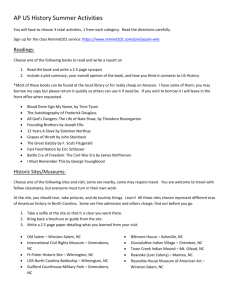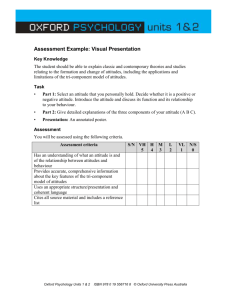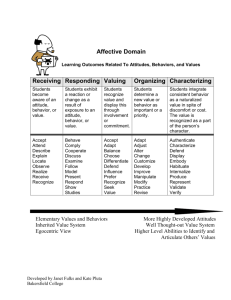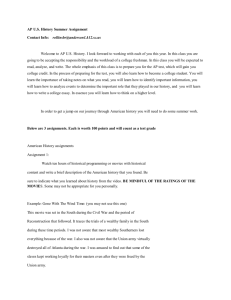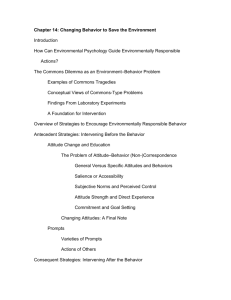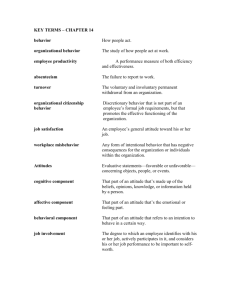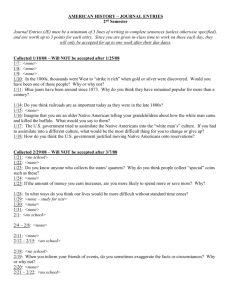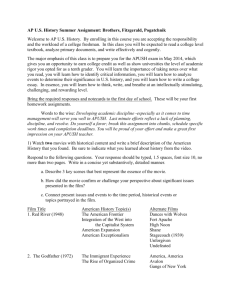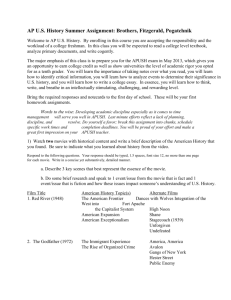Chapter 5 ATTITUDE FORMATION AND CHANGE
advertisement
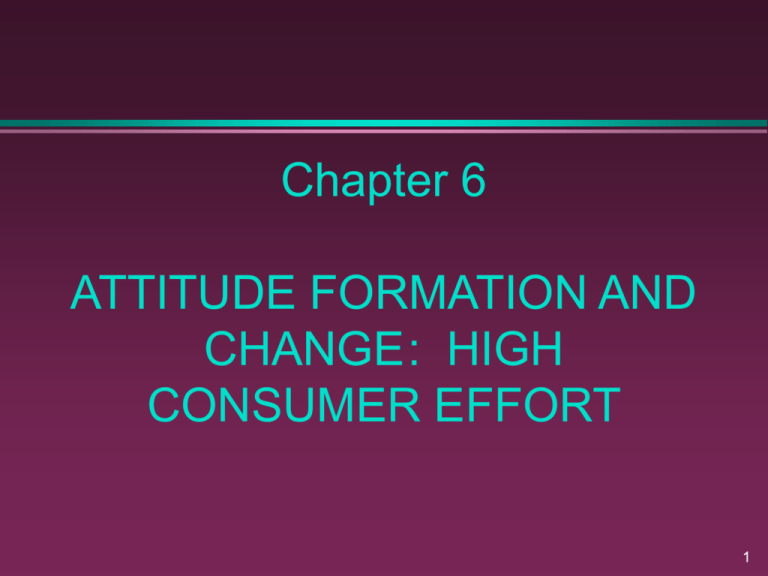
Chapter 6 ATTITUDE FORMATION AND CHANGE: HIGH CONSUMER EFFORT 1 Chapter Overview What are attitudes? Attitudes formation: cognition (thinking) » Cognitive response model » Theory of reasoned action (TORA) How to change attitudes: cognition (thinking) Attitude formation: affect (emotion) How to change attitudes: affect (emotion) 2 Definition Attitude: a relatively global and enduring evaluation of an object, issue, person, or action 3 What’s the Big Deal About Attitudes? Attitudes…… » Guide our thoughts (cognitive function) » Influence our feelings (affective function) » Affect our behavior (connative function) 4 How are attitudes formed through cognition? The Cognitive Response Model » thoughts/reactions we have in response to a message Theory of Reasoned Action (TORA) » explains how, when and why attitudes predict behavior 5 Cognitive Response Model Counterarguments (CAs) » disagreement Support arguments (SAs) » agreement Source derogations (SDs) » attack the source 6 Theory of Reasoned Action (TORA) Belief about consequences of an act (bi) Evaluation of consequences of an act (ei) Normative belief (what do important others think about this act?) (NBj) Attitude toward the act (Aact) Motivation to comply (desire to please these important others) (MCj) How much consumer is actually influenced by these others (SN) Behavioral Intentions Behavior 7 Calculating TORA Behavioral Intentions BI Aact SN Aact i biei SN j NBjMCj 8 TORA Example: Getting a tattoo B=get a tattoo BI=intention to get a tattoo Aact=your attitude toward getting a tattoo SN=what influence others have on you 9 TORA Scales bi = the likelihood that this outcome will occur is (-3) very low to (+3) very high ei = if this outcome occurs, it will be (-3) very bad to (+3) very good NBj = this person thinks I should (-3) not do it to (+3) do it MCj = how much do I care what this person thinks? (-3) don’t care at all to (+3) care very much 10 TORA Example: Aact Beliefs bi will hurt will be cool will be expensive self-expression +3 +1 +2 +3 11 TORA Example: Aact Beliefs bi will hurt +3 will be cool +1 will be expensive +2 self-expression +3 ei -3 +2 -2 +3 12 TORA Example: Aact Beliefs bi will hurt will be cool will be expensive self-expression +3 +1 +2 +3 X X X X ei Sum bi X ei -3 +2 -2 +3 = = = = + -9 2 -4 9 Therefore, Aact = -2 13 TORA Example: SN Important Others NBj Parents Sig. Other Best Friend MKT 171 Instructor -3 -3 +2 +3 14 TORA Example: SN Important Others NBj MCj Parents Sig. Other Best Friend MKT 171 Instructor -3 -3 +2 +3 -1 +3 +1 0 15 TORA Example: SN Important Others NBj MCj Sum NBj X MCj Parents Sig. Other Best Friend MKT 171 Instructor -3 X -3 X +2 X +3 X -1 +3 +1 0 = = = = +3 -9 +2 +0 Therefore, SN = -4 16 The Bottom Line BI = Aact + SN = -2 + -4 = -6 Decision: Don’t do it! 17 Theory of Reasoned Action (TORA) Belief about consequences of an act (bi) Evaluation of consequences of an act (ei) Normative belief (what do important others think about this act?) (NBj) Attitude toward the act (Aact) Motivation to comply (desire to please these important others) (MCj) How much consumer is actually influenced by these others (SN) Behavioral Intentions Behavior 18 Attitude Change Strategies Change beliefs (bi) Change evaluations (ei) Add a new belief (biei) Target normative beliefs 19 Cognitively-Based Attitude Change Issues Communication Source » spokesperson credibility » company reputation Message factors » argument quality » one- vs. two-sided messages » comparative messages 20 How are attitudes formed through affect (emotion)? Affective involvement Affective reactions 21 Affectively-Based Attitude Change Issues Communication Source » Attractiveness Message Factors » Emotional appeals » Fear appeals 22 Chapter 6 Review Definition of attitudes Attitude Formation & Change (cognitive) » Cognitive Response Model » TORA » Communication Source & Message Content Attitude Formation & Change (affect) 23
